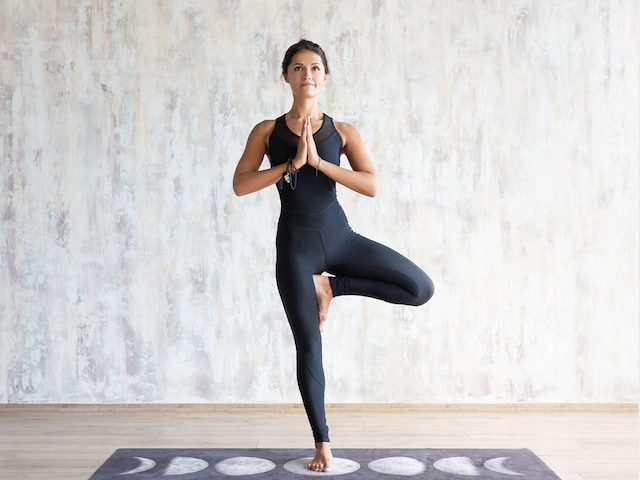You undoubtedly feel more at ease now if you practice your downward dog yoga stance today. You can feel better all over if you practice yoga on a regular basis, regardless of your level of skill.
Yoga offers physical health benefits for all ages, aiding physical and mental well-being. It’s integral in treatment plans, aiding recovery and healing.
A yoga therapist can collaborate with patients to create customized regimens that complement their surgical and medicinal treatments. In this sense, yoga can aid in the healing process and assist the patient in feeling less distressed and more concentrated during symptoms.
1. Strength, balance, and flexibility are all enhanced by yoga.
While holding a pose might help you gain strength, slow motions and deep breathing help your muscles warm up and improve blood flow.
Give it a shot: Tree Position.
Maintain equilibrium on one foot while keeping the other foot at a straight angle or close to your calf or above the knee (never on the knee). While you balance for a minute, try to keep your attention on the one area in front of you.
2. Yoga relieves pain in the back.
Yoga is just as effective as simple stretching for reducing pain and increasing the range of motion in those with lower back discomfort. For persistent low back pain, yoga is advised as a first-line treatment by the American College of Physicians.
Give it a shot: Pose in Cat-Cow Style.
Assume the four-pointed position, with your knees behind your hips and your palms beneath your shoulders. Inhale first while allowing your tummy to sink toward the ground. Then, release the breath as you arch your back like a cat stretching, pulling your navel toward your spine.
3. Yoga can reduce the symptoms of arthritis.
Gentle yoga can help some people with arthritis feel less uncomfortable when their joints are sore and inflammatory, according to a Johns Hopkins study of 11 recent studies.
4. Heart health is improved by yoga.
Regular yoga practice can support heart health by reducing inflammatory signs and stress in the body. Yoga is also beneficial for addressing excessive blood pressure and obesity, two more variables that contribute to heart disease.
Try this pose: Downward Dog.
Assume a triangle position by going to all fours, tucking your toes under, and raising your sitting bones. As you extend your spine and tailbone, maintain a small bend in your knees.

5. Yoga promotes relaxation, which improves sleep.
According to research, practicing yoga every night before bed might help you set the right attitude and prepare your body for sound sleep.
Try this pose: Legs Up the Wall.
Keeping your back on the floor and your sitting bones near to the wall, turn softly to the right and pull your legs up to rest against the wall while still sitting with your left side against the wall. You can spend five to fifteen minutes in this posture.
6. Yoga may provide you with more vitality and happier vibes.
After establishing a yoga practice, you might experience a rise in both physical and mental energy, an increase in attentiveness and enthusiasm, and a decrease in negative emotions.
7. Yoga aids with stress management.
The National Institutes of Health reports that research supports the benefits of yoga for mental health, stress reduction, mindfulness, mindful eating, weight loss, and restful sleep.
Give It a Go: In the corpse pose, also known as savasana, you should lie down with your palms facing up and your limbs gently extended away from your body. Breathe deeply and try to clear your head. You have five to fifteen minutes to hold this stance.
8. Yoga brings you into a group of supporting people.
Attending yoga sessions can reduce loneliness and create a supportive, healing environment for groups. Loneliness is lessened even in one-on-one sessions since each person is respected as an individual, listened to, and included in designing a customized yoga schedule.
9. Yoga encourages improved self-care.
Scientific Studies on the Health Benefits of Yoga
The National Institutes of Health, the U.S. military, and other major institutions are paying attention to and implementing scientific evidence supporting the benefits of yoga for healthcare.
Yoga benefits various fields like women’s health, chronic pain, osteopenia, arthritis, balance issues, and oncology, offering holistic support.
